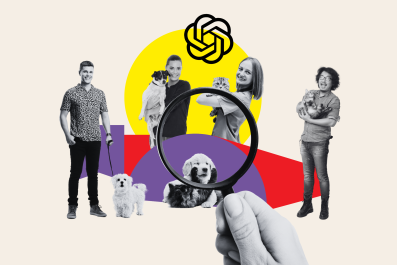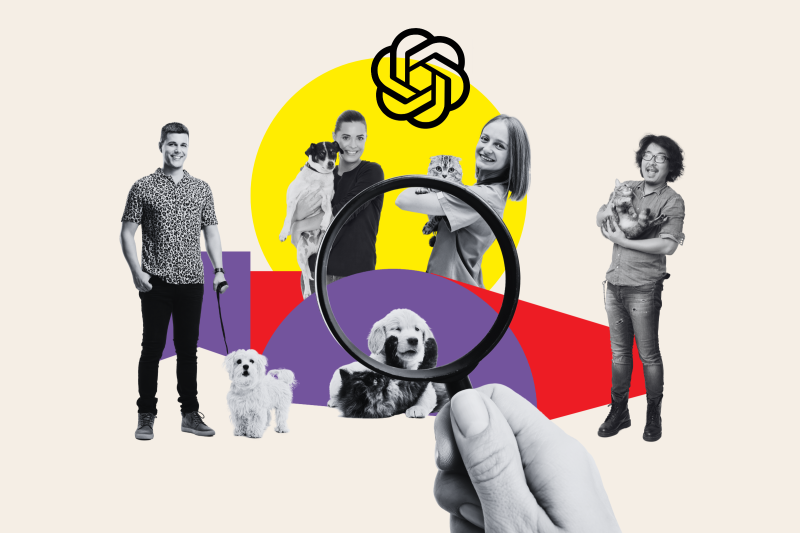
How To Spot a Cat Person vs. a Dog Person, According to ChatGPT
When it comes to pets, people often find themselves identifying as either a "cat person" or a "dog person." While it's all in good fun, the differences between these two groups can say a lot about someone's personality, lifestyle, and even their approach to relationships.
Newsweek asked the generative AI tool ChatGPT for some clues, with the following prompt: "How Can You Tell If Someone Is a Cat Person or a Dog Person? In your response, please outline factors ranging from personality, lifestyle, and relationships."
ChatGPT proposed a list of signs that include the above along with communication styles, fashion sense, humor and more. Newsweek has listed them below:
More From Newsweek Vault: Compare Top Pet Insurance Plans For Dogs
8 Ways to Know If Someone Is a Cat Person or a Dog Person

1. Personality Traits
Cat people are often seen as more independent, introverted, and reserved. They enjoy quiet, solitary activities like reading a book, binge-watching a new show, or working on a creative project.
More From Newsweek Vault: The Top Rewards Credit Cards for Pet Owners
In contrast, dog people are usually perceived as outgoing, extroverted, and social. They thrive in group settings and enjoy activities that involve other people, such as outdoor sports, social gatherings, or community events.
Newsweek previously spoke to Los Angeles–based Sylvie Sterling, the owner of an academy for cat communication.
More From Newsweek Vault: The 10 Cheapest Pet Insurance Plans
She said: "A cat that keeps hiding under the bed when visitors come over most likely reflects a person who doesn't feel comfortable around other people. An aggressive cat might reflect a person who is angry at the world and frequently chews people's heads off. Whereas a timid cat reflects a person who lets other people walk all over them."
Animal behaviorist Kait Hembree, based in Boston, Massachusetts, previously shared what a dog's personality says about its owner.
"Personalities evolve through genetics and environment which both influence learning; and the shaping of a dog's personality one way or another. Depending on the particular environment a dog lives in, certain personality traits could end up mirroring their owner's," told the head of training at GoodPup, a dog training service that operates online.
She added: "Emotions like fear can manifest as personality traits of shyness and anti-socialness in dogs, or even as displays of aggressive signals. These personality traits, however, are in no way a reflection of their owner."
2. Lifestyle Preferences
A cat person typically prefers a calm, low-maintenance environment. They may enjoy the flexibility of their routine and tend to spend more time at home, creating a space that feels controlled and serene.
Dog people, on the other hand, often embrace an active and structured lifestyle. You'll likely find them out jogging, hiking, or at the park, living a life that accommodates their need for frequent interaction and activity.
3. Approach to Relationships
When it comes to relationships, cat people are known for valuing personal space and respecting boundaries. They often seek deep, meaningful connections but are comfortable with alone time, much like their feline companions.
Dog people are generally seen as loyal and affectionate, enjoying frequent interaction and open displays of affection. They value companionship and often seek relationships that are as enthusiastic and supportive as their canine friends.
4. Home Environment
The home of a cat person might be filled with cozy corners, bookshelves, and quiet spaces perfect for curling up with a book or relaxing after a long day. There's usually a sense of order and a few designated spots for their pet to lounge.
Dog people's homes tend to be more lively and dynamic, with open spaces for play and pet-friendly furniture that accommodates their active lifestyle.
5. Social Media and Communication Style
When scrolling through social media, cat people often share witty, clever, or artsy posts, reflecting their unique perspective. They might prefer the convenience of texting or emailing over direct calls.
In contrast, dog people's social media profiles are filled with upbeat, humorous, and interactive content. They are more likely to enjoy phone calls or in-person conversations, reflecting their love for direct communication.
6. Reaction to Pets
Cat people enjoy observing their pets and appreciate the independent nature of cats. They are often patient, willing to give animals the time they need to warm up.
Dog people, however, thrive on the enthusiastic, interactive nature of dogs. They love playful greetings and enjoy the immediate affection that comes from a wagging tail.
7. Fashion Sense
When it comes to fashion, cat people often favor understated and stylish pieces that prioritize comfort. Their style tends to be more refined and relaxed, mirroring their reserved nature.
Dog people, however, lean towards practical, casual, or athletic wear. Their clothing choices often reflect their active lifestyle, ensuring they're always ready for a walk, a run, or an impromptu adventure.
8. Humor and Entertainment Preferences
Cat people enjoy humor that's subtle and clever, and they often gravitate towards entertainment with complex characters and thought-provoking plots.
Dog people, meanwhile, prefer straightforward, feel-good humor. They enjoy comedies, action-packed movies, and anything that brings a smile to their face without too much effort.
Do you have funny and adorable videos or pictures of your pet you want to share? Send them to life@newsweek.com with some details about your best friend and they could appear in our Pet of the Week lineup.
